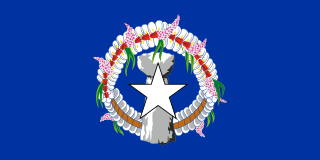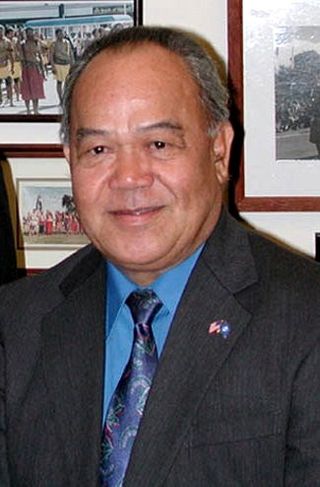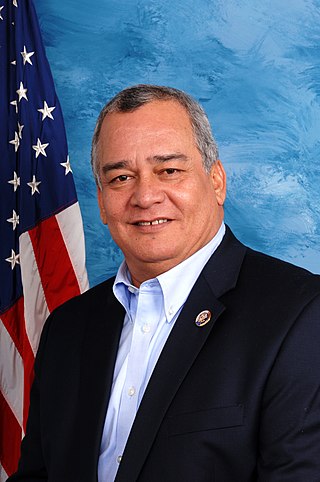Related Research Articles

The Northern Mariana Islands, officially the Commonwealth of the Northern Mariana Islands, is an unincorporated territory and commonwealth of the United States consisting of 14 islands in the northwestern Pacific Ocean. The CNMI includes the 14 northernmost islands in the Mariana Archipelago; the southernmost island, Guam, is a separate U.S. territory. The Northern Mariana Islands were listed by the United Nations as a non-self governing territory until 1990.

Saipan is the largest island and capital of the Northern Mariana Islands, a commonwealth of the United States in the western Pacific Ocean. According to 2020 estimates by the United States Census Bureau, the population of Saipan was 43,385, a decline of 10% from its 2010 count of 48,220.
Commonwealth is a term used by two unincorporated territories of the United States in their full official names, which are the Northern Mariana Islands, whose full name is Commonwealth of the Northern Mariana Islands, and Puerto Rico, which is named Commonwealth of Puerto Rico in English and Estado Libre Asociado de Puerto Rico in Spanish, translating to "Free Associated State of Puerto Rico." The term was also used by the Philippines during most of its period under U.S. sovereignty, when it was officially called the Commonwealth of the Philippines.
In the United States, each state has its own written constitution.

General elections were held in the Commonwealth of the Northern Mariana Islands (CNMI) on Saturday, 5 November 2005, electing the governor and Legislature. There was also a referendum on calling a Constitutional Convention, which was approved by voters. The gubernatorial election was the closest in the commonwealth's history, and resulted in the election of Benigno Fitial, narrowly defeating independent Heinz Hofschneider by 84 votes and incumbent Republican Governor Juan N. Babauta by an additional 98 votes. This would be the last year that the gubernatorial race would work in a first-past-the-post voting system as it would be reformed to work under a two-round system for the 2009 general elections. This election made commonwealth history by electing both the territory's first Carolinian governor and its first third party governor.

Benigno Repeki Fitial is a Northern Marianan politician who served was the sixth governor of the Northern Mariana Islands. The second longest-serving governor in CNMI history, Fitial was elected on November 6, 2005, assumed office on January 9, 2006, and was re-elected to a (five-year) second term in 2009. He was impeached by the CNMI House of Representatives on February 11, 2013, and was scheduled to face trial before the CNMI Senate to determine if he should be removed from office. He resigned on February 20, 2013, after 7 years, 1 month, and 11 days in office.

The Northern Mariana Islands Commonwealth Legislature is the territorial legislature of the U.S. commonwealth of the Northern Mariana Islands. The legislative branch of the territory is bicameral, consisting of a 20-member lower House of Representatives, and an upper house Senate with nine senators. Representatives serve two-year terms and senators serve four-year terms, both without term limits. The territorial legislature meets in the commonwealth capital of Saipan.

Pedro Agulto Tenorio, who is often known as Pete A. Tenorio, is a Northern Marianan politician. He served as the fourth Resident representative of the Northern Mariana Islands to the United States from January 14, 2002 to January 3, 2009. A member of the Republican Party, he was elected to the office first in November 2001 and again in November 2005. He served as the second lieutenant governor of the Northern Mariana Islands from January 11, 1982 to January 8, 1990.
The Supreme Court of the Commonwealth of the Northern Mariana Islands, 1 CMC § 3101, is the highest court of the United States Commonwealth of the Northern Mariana Islands (CNMI), exercising civil and criminal appellate jurisdiction over commonwealth law matters. It should not be confused with the District Court for the Northern Mariana Islands, which exercises jurisdiction over federal law. The Supreme Court sits in the capital, Saipan, and consists of a Chief Justice and two Associate Justices. The CNMI has no intermediate appellate commonwealth law court, which means that the CNMI Supreme Court hears appeals directly from the trial-level Superior Court.

The following outline is provided as an overview of and topical guide to the Northern Mariana Islands:

The Northern Mariana Islands's at-large congressional district encompasses the entire U.S. Commonwealth of the Northern Mariana Islands (CNMI). The territory does not have a voting member of Congress, but does elect a delegate who can participate in debates with the United States House of Representatives. On November 4, 2008, the first delegate was elected to the 111th United States Congress which began on January 3, 2009.

Gregorio Kilili Camacho Sablan is a Northern Mariana Islander politician and former election commissioner. Elected in 2008, Sablan became the first delegate to the United States House of Representatives from the Commonwealth of the Northern Mariana Islands. Sablan is the only Chamorro member of Congress.

The 2009 Northern Mariana Islands general election was held on Saturday, November 7, 2009. This was the last general election to be held on a odd year. This election also saw the extension all office holding officials by one year to move the elections to even-years, corresponding with the elections of other federal and state offices, including the nationwide United States House of Representatives elections and the United States general elections. This election also oversaw the first run-off to be held in the Northern Mariana Islands, which were held on Monday, November 23, 2009. Benigno Fitial became the first governor to win a second term since 1985 and the first time a candidate won a majority since 1993 thanks to the newly implemented run-off voting system.
Froilan Cruz "Lang" Tenorio was a Northern Mariana Islander politician who was the fourth governor of the Northern Mariana Islands. Elected in 1993, he served one term from January 10, 1994 to January 12, 1998. During his governorship and most of his political career, Tenorio was a member of the Democratic Party of the Northern Mariana Islands, which was not then affiliated with the American Democratic Party. However, he later switched his affiliation to the Reform Party, a party he founded. Froilan Tenorio would later switch back to the Democrat in 2005 and then to the Covenant Party in 2009.

Lesbian, gay, bisexual, and transgender (LGBT) rights in the Northern Mariana Islands have evolved substantially in recent years. Same-sex marriage and adoption became legal with the Supreme Court's ruling in the case of Obergefell v. Hodges in June 2015. However, the U.S. territory does not ban discrimination based on sexual orientation and gender identity, except in relation to government employees. Gender changes are legal in the Northern Mariana Islands, provided the applicant has undergone sex reassignment surgery.

General elections were held in the Northern Mariana Islands on 4 November, 2014. Voters elected the Governor of the Northern Mariana Islands, the Lieutenant Governor, the Attorney General, the Delegate to the US Congress, the Senate, the House of Representatives, mayors, municipal councils and the Board of Education. Additionally, a referendum involving changes to the constitution was held.
Same-sex marriage was legalized in the Northern Mariana Islands by the U.S. Supreme Court's landmark ruling in Obergefell v. Hodges on June 26, 2015, which struck down same-sex marriage bans nationwide. On June 29, Governor Eloy Inos issued a statement hailing the decision as "historic", and said he would work with the Attorney General and local officials to bring the U.S. territory into compliance. Attorney General Edward Manibusan issued a memorandum on June 30 confirming that the territory was bound by the court decision and said that marriage license forms would be changed to include same-sex couples.
Abortion in the Northern Mariana Islands is illegal by legislation, but legal by judicial ruling and legal review. A law passed in 1985 made abortion illegal, but a review by the Attorney General said it was legal in 1995. Women in the 1990s went to the Philippines to get abortions, but went to Japan or Hawaii by 2018 because of changing legality in the region.
The law of the Northern Mariana Islands includes:

General elections were held in the Commonwealth of the Northern Mariana Islands (CNMI) on 3 November 2001, electing the governor and members to the legislature. The 2001 elections marked the last general election that the dissolved Reform Party, which merged back into the Democratic Party in 2002, would appear on the ballot. Despite the economic hardships experienced under Pedro Pangelinan Tenorio's Administration, the apparent strength the 1999 general elections signaled that the Democratic Party and its splinter Reform Party had, and the newly formed Covenant Party which was formed as a splinter party from the ruling Republican Party, Republican candidate Juan Nekai Babauta won with a landslide in the four-way race. Benigno Repeki Fitial's newly formed Covenant Party landed a distant yet sizable second place. Jesus Borja of the Democratic Party won a distant third and Froilan Tenorio of the Reform Party placed fourth.